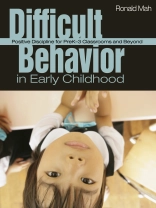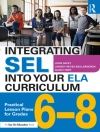‘Teachers of young children will feel validated by this book that explains the issues underlying behaviors that challenge us on a daily basis and shows how to address them effectively.’
-Xiomara Sánchez, NBCT, Dual Language Pre-K Teacher, Darwin Elementary School, Chicago, IL
‘Covers the breadth of children′s behaviors that teachers are likely to see, and describes the major motivators for them very well. The examples and scenarios are highly interesting, meaningful, and transferable to classroom practice.’
-Gail Hardesty, Early Reading First Mentor, Chicago Public Schools, IL
Increase your understanding of children to guide and shape behavior in positive ways!
Teachers are masterful in balancing the diverse backgrounds, social-emotional needs, and academic goals of children in their classroom-that is, if they can only get them to sit still, pay attention, keep their hands off of each other (or out of the fish tank), or a host of other effective aggravations! But creating a classroom of attentive learners takes more than swift discipline-it involves helping children make good behavioral choices by developing their self-control rather than controlling them to make the choices we prefer.
Difficult Behavior in Early Childhood offers insight into understanding why certain children behave in certain ways, so teachers can react appropriately to individual behaviors and needs. In an engaging, conversational tone, the book covers:
- Reconciling the different behavioral expectations of families and schools
- Applying timeout effectively
- Motivating children immediately and powerfully
- Establishing and following through with boundaries
- Developing behavior incentive plans that work
- Identifying early signs of depression, anxiety, grief, and special needs
Through informed practice, teachers can bring about positive behavioral change and healthy, productive development.
表中的内容
Acknowledgments
About the Author
Introduction
Part I. The Role of Discipline
1. Discipline in Classrooms, Families, and Society
Communities That Affect Children’s Development
Family Expectations and Classroom Expectations
Discipline From the Inside Out
Practice Makes Better
Appropriate Discipline Develops Social Competence
Chapter Highlights
Part II. Time and Using Timeout
2. Before Timeout: Understanding Children’s Sense of Time
Children’s Sense of Time
Making Time Relevant to Children
Or Else!
When There Isn’t One “Best” Choice
Likability, Validation, Acceptance, and Connection
Unconditional Love and Conditional Acceptance
Chapter Highlights
3. Three Common Uses of Timeout and Why They Fail to Work
Theory 1. The ‘Suffering’ Theory of Timeout
Theory 2. The ‘Think About It’ Theory of Timeout
Theory 3. The “How Would You Like It If…” Theory of Timeout
Chapter Highlights
4.The Community Theory of Timeout That Works
The Three Rules of Community
The Gift of Timeout
Chapter Highlights
5. Applying Timeout Effectively
Begin With Basic Boundaries and Instructions
Return to Timeout
Timeout Again?
Timeout in Perspective
Moving From Timeout to a Plan: Doing Something Differently
Chapter Highlights
Part III. Setting and Following Through With Boundaries
6. Boundaries: The Foundation for Growth and Change
Block Negative Behaviors First
Clarify Boundaries and Consequences
Ambiguity Won’t Work
Chapter Highlights
7. Follow-Through and Consistency
Follow Through With Verbal and Nonverbal Messages
Be More Stubborn Than Your Students
Constantly and Consistently Reinforce Behavior
Beyond Boundaries, Consequences, Follow-Through, and Consistency
Chapter Highlights
Part IV. Punishment, Praise, and Rewards
8. How and Why Punishment Works—and Doesn′t Work
Motivation to Misbehave
Immunity to Punishment
Intensification and Abusive Behavior
Admitting It’s Time for a Change
Discipline Is More Than Punishment Alone
Chapter Highlights
9. The Effective and Judicious Uses of Praise
Praise the Person, Not the Behavior
Self-Awareness of Achievement: The True Reward
Attention, Appreciation, and Material Rewards
Chapter Highlights
10. The Most Important Lesson of Choices
A Multiple-Choice World
Rewarding Children for Meeting Expectations
Consequences for Poor Choices Are Necessary
Reasonable and Unreasonable Behaviors
Reflecting on Your Own Choices
Chapter Highlights
11. Motivating Reward Systems: Key Issues and Effective Principles
Rewards as a Part of the Process, Not the Total Process
A Reward System Cannot Become a Punishment System
Principles of an Effective Reward System
Chapter Highlights
12. Rewards-Only Behavior Plans
‘Rewards-Only’ Means Just That
Basic Terms of the Plan
Make the Plan Practical
Success in One Area of Behavior Transfers to Other Areas
Chapter Highlights
13. Connecting Goals to Motivating Rewards
Defining Goals and Rewards
Choosing Quantifiable Goals
Defining and Quantifying Desirable Behaviors
Short-Term, Midterm, and Long-Term Goals
Goals That Involve Time Frames
Remember, No Punishments
Children Should Choose Their Rewards (Within Reason)
Age-Appropriate and Individually Tailored Rewards
Rewarding Consistency With Bonuses
Examples of Rewards-Only Incentive Plans
Always Follow Through
Chapter Highlights
Part V. Recognizing and Responding to Specific Behaviors and Emotions
14. When There Is More to It: Helping Children With Deeper Issues
Happy Children Act Out Too
Is This an Angry Child?
Is This a Sad Child?
Is This a Fearful or Anxious Child?
Is This a Child Who Is Holding Unprocessed Pain or Loss?
Is This a Child Who May Need a Referral to a Specialist?
Chapter Highlights
Conclusion: Now What?
Asking Questions
From Observations to Results
Be a Teaching Artist
References
Index
关于作者
Ronald Mah, an educator and licensed marriage and family therapist, has worked in early childhood education for 16 years. A credentialed elementary and secondary teacher, he is the author of Difficult Behavior in Early Childhood and The One-Minute Temper Tantrum Solution (2006 and 2008, Corwin Press). He wrote the Asian Pacific Islander Parent Education Support curriculum (DHS-San Francisco, 1996). Mah has DVDs on child development and behavior (Fixed Earth Films), and has been involved in community and high school mental health clinics, severe emotional disturbance, at-risk youth, welfare-to-work, and Head Start programs. A graduate college instructor and Board of Directors member of the California Association of Marriage and Family Therapists and of the California Kindergarten Association, Mah combines concepts, principles, and philosophy with practical techniques and guidelines for effective and productive results. Mah has a psychotherapy practice in San Leandro, California where he works with children, teens, adults, couples, and families.












